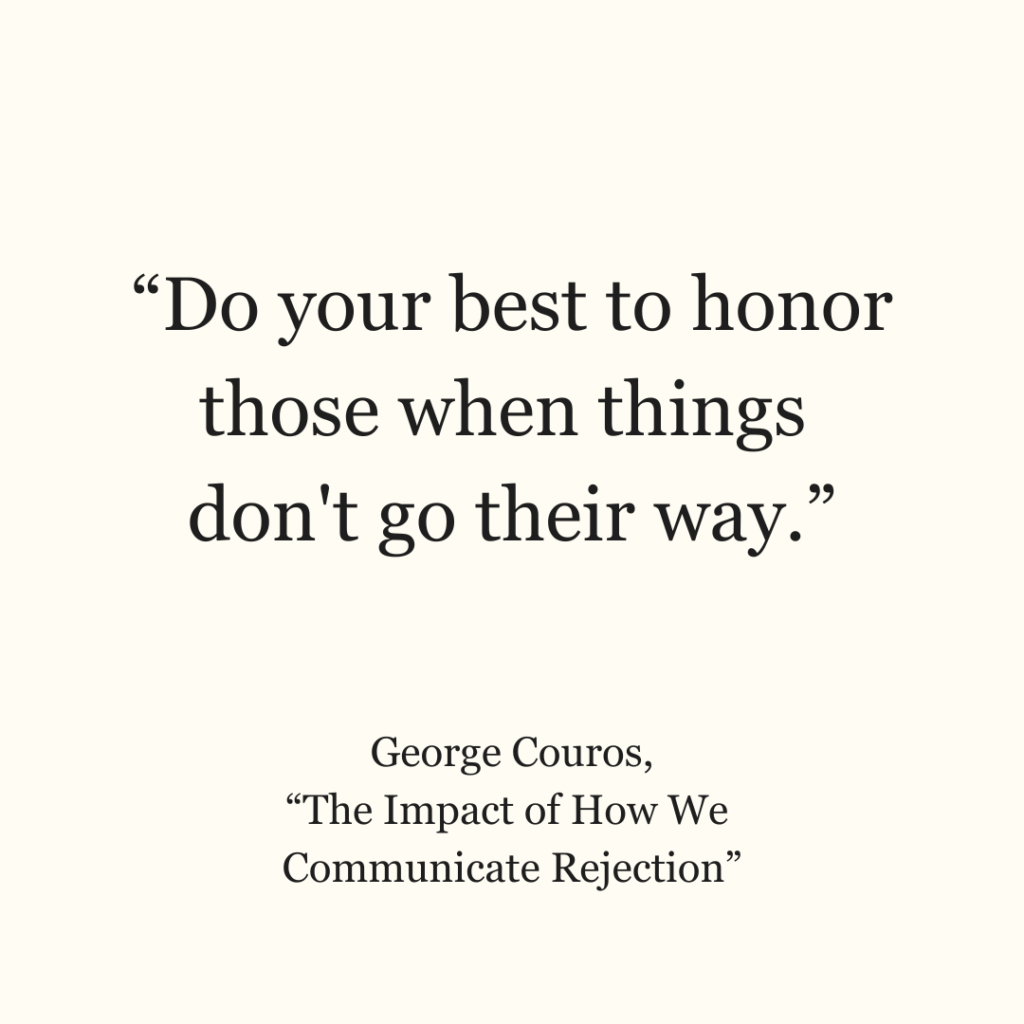
Many people are applying for new roles currently, and how you treat those who end up dealing with the rejection of not getting a job will say a lot about you as a person and as a leader.
This popped into my mind as I was told a story about someone who had recently applied for a job opportunity, went through the interview process, and found out they were unsuccessful in getting the position, not from the person who led the candidate search or interview, but through social media.
Not getting a job or opportunity you were hopeful of receiving is already a tough pill to swallow, but finding out through a social media post and not directly from the interviewer or organization before can lead to feelings of embarrassment.
If you don’t have the bravery to tell someone they didn’t get a job, you might not be ready for a position where you are hiring in the first place.
Personally, I have been on both ends of this process. Of course, there were jobs and opportunities that I didn’t get, and the times that I was given the courtesy of not only a conversation or some feedback were ones that I greatly appreciated. It still stung, but I felt respected in the process.
In one way, how you treat someone when they can no longer do something for you says a lot about you as a person.
Here is something that I used to do to honor people who are about to receive a rejection.
When I was an administrator, and we held interviews for positions, typically, we would have four candidates go through the interview process. Once our team decided who we would offer the job to, we would call the preferred candidate and share our excitement about the potential of joining our team. If they accepted, we would ask them for a few days before they shared with others, as we wanted to inform the other candidates that they did not get the job personally. We wanted to honor them by sharing that information, even though it was hard to do so, directly. If they were willing to apply, give their time for an interview, and go through the process, the least we could do was let them know directly that they did not get the job.
But that was the least we could do, and I wanted to try and ensure that although they weren’t successful in getting the position, we could maybe help set them up for success in the future.
Once I called candidates, I would first tell them that we had offered the job to someone else, and they accepted. After that initial communication, I would then ask them if they were open to some feedback on what they did well, as well as areas they could improve. It was clearly communicated that I was not trying to “fix them” or anything like that, but I was hoping that I could give them some feedback to help them be successful in any opportunities that may come up in the future. If, in education, we are all about kids, then that would also mean kids who are not in our schools. They might not have gotten the job at our school, but if I could help them be successful somewhere else since we had only one job at the time, I saw nothing detrimental about that approach.
Honestly, some weren’t interested in feedback, and I get that.
There have been times when I felt rejected, personally and professionally, and I am just not in the mood for advice. But most of the time, people were open to feedback and appreciated that I was willing to provide some guidance.
There was one particular time when we had an incredible candidate in the interview process, but we decided to go with someone else. When I called to let her know and offer some feedback, we spent the next hour on the phone discussing the interview and some ideas for future interviews. She was so gracious, and I was glad to help her.
About two weeks later, she emailed me directly and thanked me for the time I had spent with her. The feedback I provided had just helped her secure a position at another school. About a decade later, she invited me to keynote the opening day for her school district. That all happened because of how I communicated with her when she didn’t get the job.
People might not be successful in obtaining a position in your organization, but how we treat them to ensure they find success in other pursuits and opportunities not only says a lot about you but will also help them and all the people they serve in the future.
Being gracious and supportive through the process of rejecting candidates might not seem to matter now, but it might later.
The person you didn’t hire today might be your boss or have an opportunity you covet in the future. You might not remember the process, but I assure you, they will.
Do your best to honor those when things don’t go their way.
(I did an outdoor podcast on this topic, which has some similarities and differences with what I shared in this post. You can check it out here on Apple Podcasts or YouTube.)